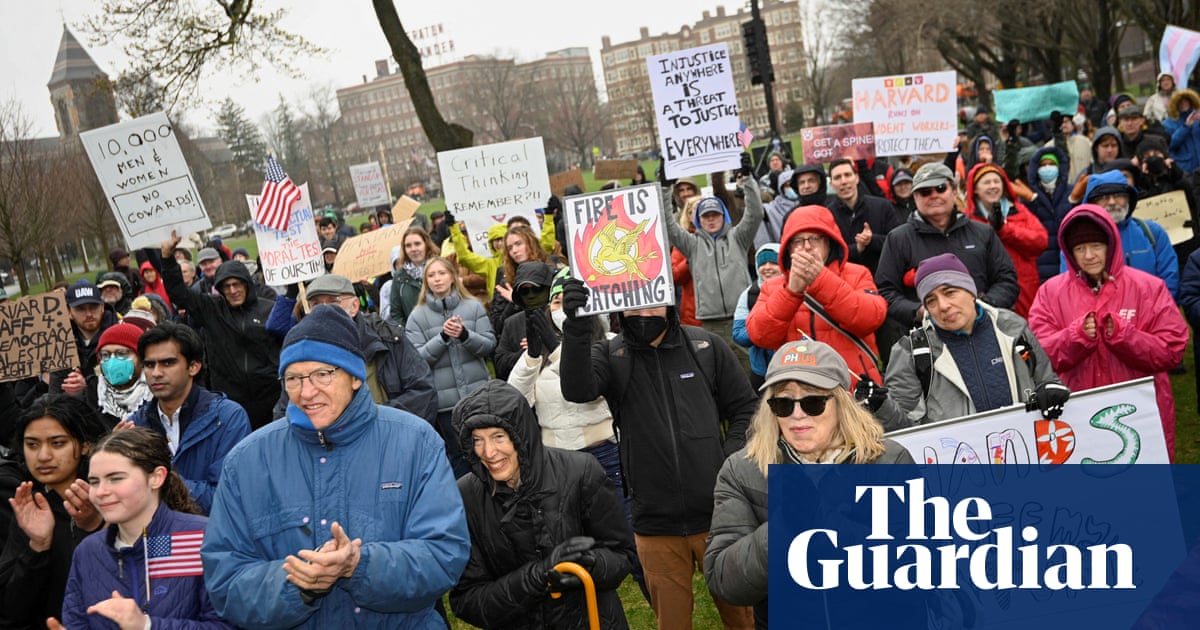Barack Obama, Yale and other academic institutions have come out in support of Harvard after the Trump administration elected to cut $2bn of its federal grants after the Ivy League school in Massachusetts rejected what it said was an attempt at “government regulation” of the university.
“Harvard has set an example for other higher-ed institutions – rejecting an unlawful and ham-handed attempt to stifle academic freedom, while taking concrete steps to make sure all students at Harvard can benefit from an environment of intellectual inquiry, rigorous debate and mutual respect,” said a statement from Obama, the US president from 2009 to 2017. “Let’s hope other institutions follow suit.”
The standoff between some of the US’s most prestigious universities and the federal government deepened overnight on Monday after Harvard rejected elevated demands by Donald Trump’s administration, which the president has called an effort to curb antisemitism on campus. Many educators, however, see the demands as a thinly veiled effort to more broadly curb academic freedoms.
“No government – regardless of which party is in power – should dictate what private universities can teach, whom they can admit and hire, and which areas of study and inquiry they can pursue,” Harvard’s president, Alan Garber, said.
The Trump administration, through the multi-federal agency joint task force to combat anti-semitism, responded by freezing $2.2bn in multi-year grants and $60m in multi-year contract value to Harvard.
“Harvard’s statement today reinforces the troubling entitlement mindset that is endemic in our nation’s most prestigious universities and colleges – that federal investment does not come with the responsibility to uphold civil rights laws,” the agency said in a statement.
The intervention by Obama came after 876 faculty members at Yale University, Harvard’s fellow Ivy League institution, published a letter to their leadership expressing support for standing up to the Trump administration.
“We stand together at a crossroads,” the letter read. “American universities are facing extraordinary attacks that threaten the bedrock principles of a democratic society, including rights of free expression, association, and academic freedom. We write as one faculty, to ask you to stand with us now.”
Princeton in New Jersey and Columbia in New York, both sites of pro-Palestinian protests in 2024, have agreed to comply with a series of demands from the Trump administration about how they will handle such demonstrations, academic departments and antisemitism after both received warnings they would lose federal funding.
Columbia agreed to a ban on face masks for the purposes of concealing one’s identity, bar protests inside academic buildings and to review of how regional Middle East studies programs are administered. They also acquiesced to expanding “intellectual diversity”, including by appointing new faculty members to its Institute for Israel and Jewish Studies department.
The stated goal of the Trump administration’s antisemitism taskforce is to “root out antisemitic harassment in schools and on college campuses”. But many believe that is a cover for a range of conservative goals, including eliminating racial quotas in admissions – and resetting what the administration sees as a far-left bias in academia.
“We are going to choke off the money to schools that aid the Marxist assault on our American heritage and on western civilization itself,” Trump said in 2023. “The days of subsidizing communist indoctrination in our colleges will soon be over.”
In March, the taskforce leader, Leo Terrell, a former Fox News commentator, said, “We’re going to bankrupt these universities” if they do not “play ball”.
The administration, in total, has frozen or canceled more than $11bn in funding from at least seven universities as part of its effort to end what it calls “ideological capture”. At least 300 students, recent graduates and postdoctoral students have had their visas and legal immigration statuses revoked as part of the crackdown.
The Massachusetts Institute of Technology president, Sally Kornbluth, said on Monday that nine MIT students had seen their visas revoked over the previous week – revocations that she said would have a chilling effect on “top talent” worldwide and would “damage American competitiveness and scientific leadership for years to come”.
But Trump’s education secretary, Linda McMahon, told the Wall Street Journal that it was within the federal government’s power to ask universities to make changes to campus policies.
“If you’re taking federal funds, then we want to make sure that you’re abiding by federal law,” McMahon said, though she rejected that the administration was attempting to curb academic freedom and the right to peacefully protest or disagree.
A White House spokesperson, Kush Desai, told the outlet that the taskforce “is motivated by one thing and one thing only: tackling antisemitism”.
Desai said: “Antisemitic protesters inflicting violence and taking over entire college campus buildings is not only a crude display of bigotry against Jewish Americans, but entirely disruptive to the intellectual inquiry and research that federal funding of colleges is meant to support.”



